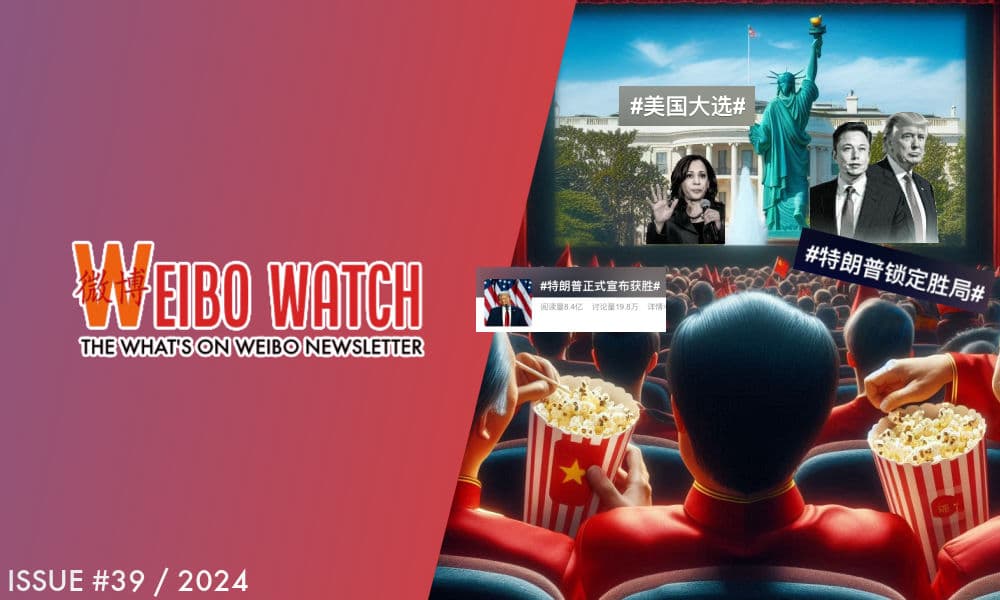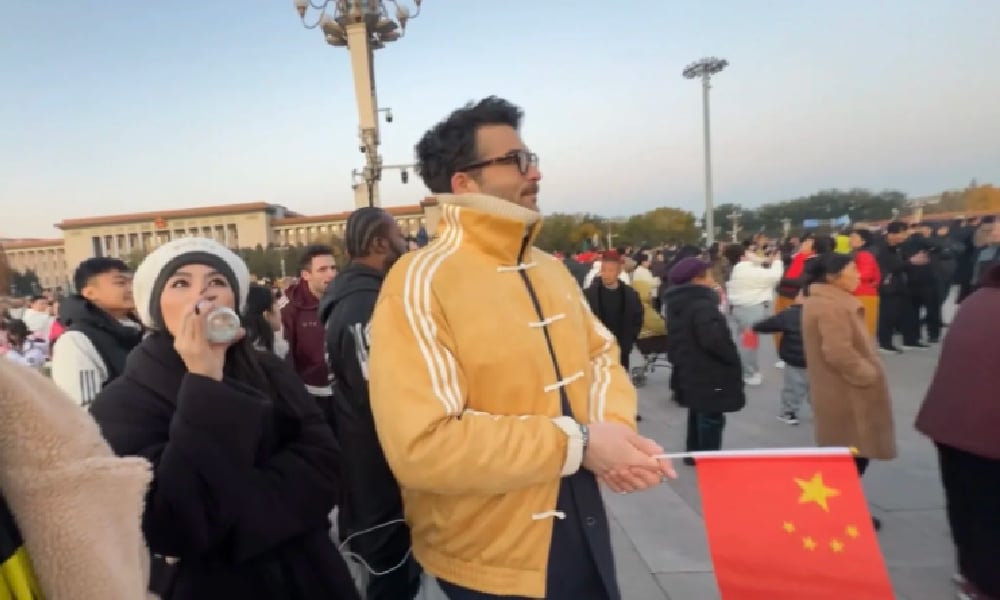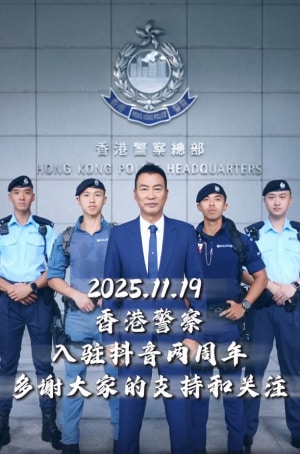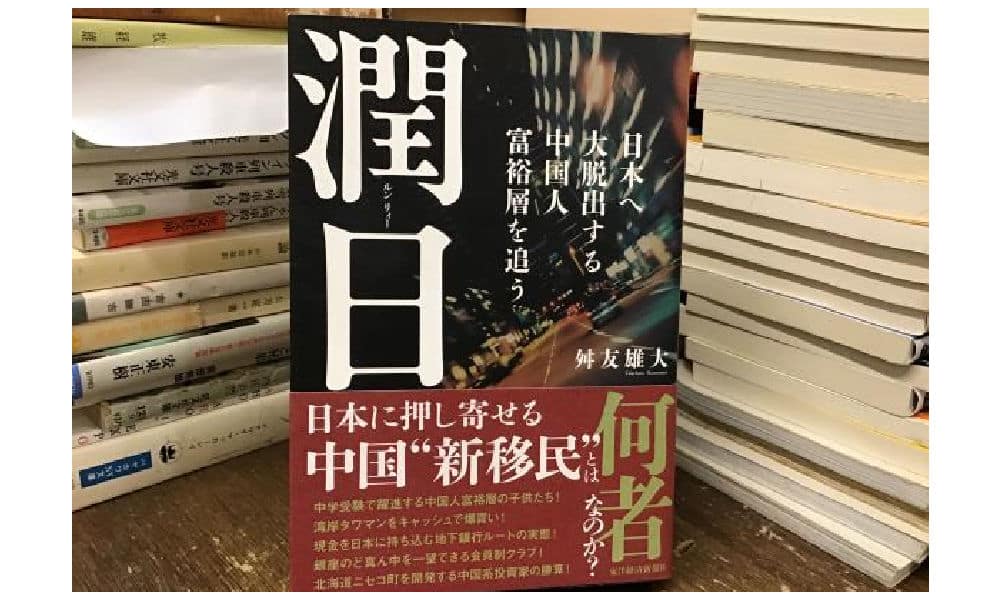Featured
Weibo Watch: “Comrade Trump Returns to the Palace”
From stocks to memes, Chinese netizens turn Trump’s win into a blend of playful speculation and some serious debate.
Published
1 year agoon

PREMIUM NEWSLETTER | ISSUE #39
This week’s newsletter:
◼︎ 1. Editor’s Note – “Comrade Trump Returns to the Palace”
◼︎ 2. What’s New – A closer look at featured stories
◼︎ 3. WeiboWatch List – Online discussions to watch
◼︎ 4. What’s Noteworthy – Hu Xijin is back
◼︎ 6. What’s Popular – New series features story of Xi’s father
◼︎ 7. What’s Memorable – Trump’s 2016 win
◼︎ 8. Weibo Word of the Week – Digital Ibuprofen
Dear Reader,
“Good morning, everyone. A new day with global impact has begun,” Weibo blogger “MLRS270” wrote early Wednesday morning, China time. Weibo, like the rest of the world, has been closely watching how American voters would shape the outcome of the 2024 US presidential election. With half a million followers, MLRS270 claimed that Harris’s victory was already “set in stone.”
Twelve hours later, however, the online discussions looked very different. Trump’s win dominated Weibo trending topics and the hashtag “Trump Officially Declares Victory” (#特朗普正式宣布获胜#) received over 870 million views.
“The upcoming four years are going to be entertaining,” a popular comment said. Posts, videos, and memes on Trump’s win immediately began to surface, not just on Weibo but also on other Chinese social media platforms like WeChat and Xiaohongshu.
The ‘entertainment’ surrounding the American elections had already started earlier. Most noteworthy was the sudden surge in stock value for a Chinese company called Sichuan Wisdom Co. Ltd. (川大智胜). This spike occurred simply because the company’s name sounds like “Trump winning.”
The Chinese name, Chuān Dà Zhì Shèng (川大智胜), belongs to a software company unrelated to Trump. But its name’s first character, Chuān—which in this context refers to Sichuan—is also used in the Chinese transliteration of Trump’s name, leading some to interpret it as “Trump Grand Wisdom Victory.”
For fun, Chinese investors began buying shares. “To support you, I’ve bought some stocks,” one Weibo user from Sichuan wrote, posting an orange heart emoji. The stocks continued to rise when Trump’s actual win became known (#川大智胜午后涨停#).

Chuān Dà Zhì Shèng (川大智胜) stocks going up.
Meanwhile, another company named Haers (哈尔斯 Hāěrsī), which sounds like Harris in Chinese, saw a sudden drop in its stock. That Zhejiang company, which produces vacuum-insulated containers, also got caught up in the elections (#哈尔斯股价大跌#).

Some Chinese economic news channels noted that “external developments” were clearly playing a role in these market fluctuations, and warned people that this kind of short-term, non-logical speculative trading was not recommended. They suggested it would be better to “enjoy the show from the sidelines” (“看个热闹”).
Nevertheless, the momentary fluctuation in ‘Trump’ versus ‘Harris’ stocks did show a general preference for Trump among the Chinese online public.
While the idea of Trump being a more ‘entertaining’ American president than Harris often comes up in Chinese online discussions on the election outcome, there are also more serious discussions about whether Trump’s presidency would be good or bad for China.
Despite what happened in the past, many netizens suggest that Trump, with his pragmatic and business-oriented mindset, will be “more favorable” for China and “better for global stability.” Despite the downsides of protectionist trade policies and high tariffs on China, it is believed that the potential benefits would outweigh them through, for example, improved diplomatic relations and cooperation in tech. Trump’s view of China as an open economic competitor would allow China to respond directly and strategically.
Harris, on the other hand, is viewed less favorably by Chinese social media commenters who believe that China would be seen as a political adversary under her presidency, employing underhanded tactics to contain and undermine China. In their view, she represents the American political elite, which they perceive as engaging in covert power plays worldwide for political gain. Trump’s explicit focus on economic competition is something many find more relatable.
Her perceived “elitism” is also linked to her calls for the need to “stay woke,” a message that hasn’t resonated with many Chinese netizens, who often associate “wokism” with political elites and Western hypocrisy. In contrast, many prefer to support the more practical and relatable “grassroots.”
However, many also believe that for China, it does not matter who won in the end. “In reality, whoever takes office brings new challenges,” a well-known military and current affairs blogger (@后沙月光本尊) wrote. This sentiment was echoed by many others. When Iraqi Weibo blogger Omar (@欧玛omar) suggested that Trump’s return to power would be unfavorable for China due to his “wild schemes against China” and his “crude remarks,” dozens of commenters replied: “It would’ve been the same either way.” “The Democrats are no different.” “China is not afraid.”
A general consensus seems to be that, if it makes no difference to them who’s in the White House, it might as well be someone they find amusing and interesting. In this regard, Trump is the preferred winner for many netizens, who congratulate “the King of Understanding” for his “reemployment.”

Chinese meme: “Trump returns to the palace.”
Trump earned the title “King of Understanding” (dǒngwáng 懂王, also ‘King of Knowing’) on Chinese social media for his often-quoted claims of understanding complex issues better than anyone else (“people are really surprised I understand this stuff”). (Harris, by the way, was nicknamed ‘Sister Haha’ (哈哈姐) or the “King of Laughter” (笑王) for her frequent, distinctive laughter during public appearances.)
Another famous nickname for Trump is “Comrade Jianguo” (建国同志), meaning “Comrade Build-the-Country.” This nickname humorously suggests that Trump’s leadership, which is meant to “make America great again,” inadvertently accelerates China’s rise. Over the years, these playful nicknames have blended mockery with affection, reflecting the humorous perspective many Chinese social media users have toward Trump’s antics.
While Western platforms like Reddit are filled with shock and dread today, Weibo is mostly buzzing with lighthearted banter and optimism. “Looking ahead, keep an eye on sectors like artificial intelligence, autonomous driving, fintech, and Musk-related stocks,” one commenter wrote. “Trump loves Elon. We might even see peace between Russia and Ukraine, or Kim Jong-un watching an NBA game with Trump. And of course, we’d welcome Comrade Jianguo to visit Hainan for some tourism—after all, he loves doing business, and we have free trade.”
When blogger Wu Pei (@吴佩) asked netizens what Trump’s win would realistically mean for them, responses ranged from “crashing stock markets” and “setbacks for EV companies” to “heightened trade frictions.” The only thing people seem to agree on is that it would be best to sit back and watch the spectacle as “Comrade Trump returns to the palace.”
This edition of Weibo Watch was co-curated by Miranda Barnes. Wendy Huang contributed an insightful article on the recent controversies surrounding Chinese livestream stars, and Ruixin Zhang provides a must-read piece on the ongoing crackdown on online smut.
Best,
Manya Koetse
(@manyapan)
What’s New

Forbidden Stories | A recent crackdown on Chinese authors writing erotic webnovels has sparked increased online conversations about the Haitang Literature ‘Flower Market’ subculture, the challenges faced by prominent online smut writers, and the evolving regulations surrounding digital erotica in China. But how serious is the ‘crime’ of writing explicit fiction China today?

Viral Bao’an | This is the video that made a Xiaoxitian (Shanxi) security guard go viral in China. In the popular video, he tells a Douyin vlogger about his raise from 1,700 yuan/month (US$240) to 2,200 yuan ($310), thanks to a tourism boom driven by the popular game Black Myth: Wukong. Shortly after gaining online fame, he shared in another video that he’d been dismissed, looking tired and saying, “They [the superiors] told me not to work anymore. I didn’t say anything wrong, but they don’t want me to continue.” This sparked a wave of outrage online. More about that here 👇.

Livestream Scandals | As livestreaming continues to gain popularity in China, so do the controversies surrounding the industry. Negative headlines involving high-profile livestreamers, as well as aspiring influencers hoping to make it big, frequently dominate Weibo’s trending topics. ‘Wanghong’ used to be a mark of online fame, but now, it’s increasingly tied to controversy and scandal. Read this deep dive ➡️
WeiboWatch List
🚫 Forbidden Fashion
A group of foreign fashion designers linked to the brand Fecal Matter were denied entry to Beijing’s Forbidden City on October 15. The group, consisting of American designer Rick Owens, his wife Michèle Lamy, and Fecal Matter members Hannah Rose Dalton and Steven Raj Bhaskaran, made headlines internationally after posting photos on social media of themselves posing outside the Forbidden City. According to their post, security had informed them that they could enter if they removed their makeup and changed into “normal” clothing, a request they declined. While the designers framed the incident as motivation to continue fighting for “greater acceptance and tolerance for difference around the world,” Chinese media and social media users viewed it as a sign of disrespect (#外国游客因着装问题被劝离故宫#).

The Forbidden City issued a statement on the 18th, clarifying that it has no specific dress code for visitors, “as long as it’s not too exaggerated.” A top comment on a Weibo thread about the incident, which received over 100,000 likes, read: “When in Rome, do as the Romans do (客随主便, kè suí zhǔ biàn). If you insist on your freedom to dress as you please, then don’t come to my house!”
👻 Halloween Crackdown
The Forbidden City incident wasn’t the only costume-related controversy in China this month. In Shanghai, local police patrolled popular areas to monitor Halloween celebrations. Although there was no nationwide or citywide ban, some videos showed costumed individuals being escorted away by police or forced to remove their outfits. There was a significant police presence on Julu Road and in Zhongshan Park, with the latter even temporarily closed to prevent large gatherings.
Last year, Halloween celebrations in Shanghai caused a frenzy on the Internet. Instead of traditional Halloween themes, young people on Julu Road and beyond brought pop culture memes and social commentary to life through creative costumes. Many outfits were playful, some queer, and others served as social critiques, with costumes depicting surveillance cameras and COVID-19 medical workers. Some even described the event as “China’s very own pride walk.” However, it’s now clear that local authorities are keen to prevent Shanghai’s Halloween festivities from evolving into a larger cultural celebration or protest.
📉 Math Competition Outcome
You might remember the story that went viral earlier this year about Jiang Ping (姜萍), the seventeen-year-old vocational school student who reached the top 12 on the finalist list of the Alibaba Global Mathematics Competition, competing against students from elite universities worldwide. Her success story—coming from a humble rural family and excelling in math as a fashion student under the guidance of her teacher Wang Runqiu (王润秋)—initially resonated but was soon questioned. Critics doubted the authenticity of Jiang Ping’s initial score, not only because she wasn’t a math major but also because her score allegedly surpassed her own teacher’s.
Now, the results of the 2024 Alibaba Mathematics Competition, originally set for August, are finally out. Neither Jiang Ping nor her teacher appears on the list. The competition committee released a statement confirming that Wang Runqiu had assisted Jiang Ping in the preliminaries, violating the “no collaboration with others” rule. It’s a disappointing outcome—not only because the competition allowed room for cheating, which Wang and Jiang exploited, but also because Jiang had become an inspirational role model for many math-loving girls from non-elite backgrounds. Now, she has fallen from that pedestal.
🔪 Xiaomi SU7 Stabbing Incident
A 23-year-old man from Nantong named Kang, who had just purchased the Tesla competitor Xiaomi SU7, recently became a trending topic on Chinese social media after fatally stabbing a biker enthusiast. Kang, who was part of a motorcycling chat group, shared his new 300,000-yuan ($42,200) Xiaomi SU7 EV in the group, only to be mocked by some members. When the Xiaomi EV owner and bikers later met in person outside a coffee shop popular with bikers, the encounter escalated. Kang pulled out a knife, fatally stabbing one of the group members, then fled in his brand-new car, crashing through a storefront and ramming into motorcycles. A video of the incident went viral online. Kang was arrested shortly afterward.

The incident sparked conversations about how the 23-year-old, a recent university graduate, reached this breaking point. A popular blogger, @黑哥爆料, suggested that Kang’s parents had supported him in buying the costly car, hoping he would work hard and settle down. Lacking the social recognition he had hoped for, the situation with the bikers pushed him to his limits. While Kang bears responsibility for his actions, the blogger suggests that the group could have de-escalated the tension by acknowledging him instead of bullying him. In the end, this incident has devastated multiple lives, including the victim’s, Kang’s, and also Kang’s parents, who now bear the financial and emotional toll of their son’s actions.
🍰 Swiss Roll Conversations
“How to divide 8 Swiss rolls?” (8个瑞士卷怎么分?) This question recently became a trending topic on Weibo after a stay-at-home mom shared a video about her experience buying a box of Swiss rolls with eight pieces. Her daughter ate two, her son ate two, and her husband ate two. She assumed the last two pieces were hers, but her husband scolded her, saying she should set a good example by not snacking, and that it was selfish not to save the last pieces for the kids.
The video sparked widespread debate, quickly becoming a symbol for broader issues like gender relations, the division of household labor, and the role of stay-at-home moms. Some feminists expressed outrage over the incident, while others suspected the video was staged to create controversy and attract views. The incident has now drawn so much attention that cyberspace authorities have intervened to investigate whether the Swiss Roll story is genuine. Bon appétit? Let’s see how this unfolds.
What’s Noteworthy

For nearly 100 days, since July 27, the well-known social and political commentator Hu Xijin (胡锡进) remained silent on Chinese social media. This was highly unusual for the columnist and former Global Times editor, who typically posts multiple Weibo updates daily, along with regular updates on his X account and video commentaries.
Various foreign media outlets speculated that his silence might be related to his comments about the Third Plenum and Chinese economics, especially regarding China’s shift to treating public and private enterprises equally. Without any official statement, Chinese netizens were left guessing about his whereabouts. Most assumed he had, in some way, taken a ‘wrong’ stance in his commentary on the economy and stock market, or perhaps on politically sensitive topics like the Suzhou stabbing of a Japanese student, which led to his being sidelined for a while.
On October 31, Hu suddenly reappeared on Weibo with a post praising the newly opened Chaobai River Bridge, which connects Beijing to Dachang in Hebei—where Hu owns a home—significantly reducing travel time and making the more affordable Dachang area attractive to people from Beijing. The post received over 9,000 comments and 25,000 likes, with many welcoming back the old journalist. “You’re back!” and “Old Hu, I didn’t see you on Weibo for so long. Although I regularly curse your posts, I missed you,” were among the replies.
Not everyone, however, is thrilled to see his return. Blogger Bad Potato (@一个坏土豆) criticized Hu, claiming that with his frequent posts and shifting views, he likes to jump on trends and gauge public opinion—but is actually not very skilled at it, which allegedly contributes to a toxic online environment. Other bloggers also take issue with Hu’s tendency to contrast himself, or disagree with the stances he makes in new posts.
When Hu wrote about Trump’s win, the top comment read: “Old Trump is back, just like you!”

Hu seems delighted to be back. He hasn’t mentioned his absence but shared a photo from 1978, when he joined the military, reflecting on his journey of growth, learning, and commitment to the country. He has a way of admiring himself—and, occasionally, we don’t mind admiring him too. Welcome back, Hu.
What’s Popular

The TV series Years in the Northwest (西北岁月), premiering on CCTV 1 this week, tells the story of Xi Jinping’s father, longtime PLA leader Xi Zhongxun (习仲勋, 1913-2002). This is the first historical drama to focus on Xi Zhongxun, highlighting his “extraordinary experiences and achievements” during the 25 years he spent in the Shaanxi-Gansu border region from 1927 to 1952.
Xi Zhongxun joined the Communist Party in 1928 and went on to become a prominent revolutionary and political leader. In the northwest’s Shaanxi-Gansu border region, he played a critical role in establishing revolutionary bases. Working alongside notable figures like Peng Dehuai (彭德怀), his efforts were instrumental in consolidating Party influence in the region.
On social media, some viewers of the first episode have shared emotional responses, while others praise popular actor Wu Lei (吴磊, 1999) for his portrayal of the young Xi Zhongxun.

One interesting aspect of the series’ announcement on Weibo is the unusually high number of shares—over 620,500—compared to the relatively low number of comments, suggesting that online discussions surrounding the series are controlled and contained.
What’s Memorable

On the morning of November 9, 2016 (Beijing time), the world received news of Donald Trump’s victory in the U.S. presidential election. In our coverage of Trump’s win at the time, we provided insight into Chinese reactions to America’s unconventional new president. From official Chinese media to Weibo netizens, responses to Trump’s triumph were favorable, critical, humorous, but above all, mixed.
Weibo Word of the Week

Digital Iboprofen | Our Weibo word of the week is 电子布洛芬 (diànzǐ bùluòfēn), which translates to “Digital Ibuprofen” or “Electronic Ibuprofen.”*
This week, the term came up when fans told Chinese actor and singer Tan Jianci (檀健次) that he is their “digital ibuprofen.” Tan, with a puzzled look, asked what that meant. A fan explained, “It means we feel better when we see you” (or, essentially, “our bodies feel no pain”). Since then, Tan Jianci has become associated with the term “digital ibuprofen.”
Although the phrase resurfaced this week, it has been around for some time, gaining popularity in 2022-2023 among fans of entertainment shows. It refers to content that provides relief from stress or discomfort, much like how ibuprofen alleviates physical pain. For instance, the Hunan TV show Go for Happiness (快乐再出发) is often called “digital ibuprofen.”

Chiikawa is the original ‘digital ibuprofen’. Image via @南岛客厅.
The term saw a surge in popularity alongside the Japanese animated series Chiikawa, which became a viral hit among young people. The anime’s portrayal of its cute character staying optimistic despite life’s stresses earned Chiikawa the nickname “digital ibuprofen,” as fans found comfort in its stories (read more in this story by Sixth Tone).
“Digital ibuprofen” applies to more than just shows—it can be any content, such as videos, memes, or idols, that provides comfort, distraction, and relief to fans.
In the same category, there’s also “digital pickled mustard” or “electronic pickled mustard” (电子榨菜, diànzǐ zhàcài), which refers to a binge-worthy or comforting show.
*The term 电子 (diànzǐ) means “electronic” and is commonly used in modern Chinese terms, much like the English “e-” prefix in ebook (电子书) or email (电子邮件). It’s also used for digital transactions, like digital payments (电子支付) or digital wallets (电子钱包).
Featured image of Tan Jianci’s head inside an ibuprofen pill, on Xiaohongshu via 燋糖栗子.
This is an on-site version of the Weibo Watch newsletter by What’s on Weibo. Missed last week’s newsletter? Find it here. If you are already subscribed to What’s on Weibo but are not yet receiving this newsletter in your inbox, please contact us directly to let us know.
Manya is the founder and editor-in-chief of What's on Weibo, offering independent analysis of social trends, online media, and digital culture in China for over a decade. Subscribe to gain access to content, including the Weibo Watch newsletter, which provides deeper insights into the China trends that matter. More about Manya at manyakoetse.com or follow on X.

You may like
China Brands, Marketing & Consumers
Signals: Hasan Piker’s China Trip & the Unexpected Journey of a Chinese School Uniform to Angola
Hasan Piker’s controversial China tour, a Chinese school uniform resurfaces in Africa, a new winter hotspot, why Chinese elites ‘run’ to Tokyo, and more.
Published
2 days agoon
November 21, 2025
🌊 Signals — Week 47 (2025)
Part of Eye on Digital China, Signals highlights slower trends and online currents behind the daily scroll. This edition was sent to paid subscribers — subscribe to receive the next issue in your inbox.
Welcome to another edition of Eye on Digital China. Different from the China Trend Watch (check the latest one here if you missed it), this edition, part of the new Signals series, is about the slower side of China’s social media: the recurring themes and underlying shifts that signal broader trends beyond the quick daily headlines. Together with the deeper dives, the three combined aim to give you clear updates and a fuller overview of what’s happening in China’s online conversations & digital spaces.
For the coming two weeks, I’ll be traveling from Beijing to Chongqing and beyond (more on that soon) so please bear with me if my posting frequency dips a little. I’ll be sure to pick it up again soon and will do my best to keep you updated along the way. In the meantime, if you know of a must-try hotpot in Chongqing, please do let me know.
In this newsletter: Hasan Piker’s controversial China tour, a Chinese school uniform in Angola, a new winter hotspot, discussions on what happens to your Wechat after you die, why Chinese elites rùn to Tokyo, and more. Let’s dive in.
- 💰 The richest woman in China, according to the latest list by Hurun Research Institute, is the “queen of pharmaceuticals” Zhong Huijuan (钟慧娟) who has accumulated 141 billion yuan (over 19 billion USD). Women account for over 22% of Chinese billionaires (those with more than 5 billion RMB), underscoring China’s globally leading position in producing wealthy female entrepreneurs.
- 🧩 What happens to your WeChat after you die? A user who registered for NetEase Music with a newly reassigned phone number unexpectedly gained access to the late singer Coco Lee’s (李玟) account, as the number had originally belonged to her. The incident has reignited debate over how digital accounts should be handled after death, prompting platforms like NetEase and Tencent to reconsider policies on long-inactive accounts and take stronger measures to protect them.
- 📱 Although millions of viewers swoon over micro-dramas with fantasy storylines where rich, powerful men win over the “girl next door” through money and status, Chinese regulators are now stepping in to curb exaggerated plots featuring the so-called “dominant CEO” (霸道总裁) archetype, signaling stricter oversight for the booming short drama market.
- ☕ A popular Beijing coffee chain calling itself “People’s Cafe” (人民咖啡馆), with its style and logo evoking nationalist visual nostalgia, has changed its name after facing criticism for building its brand – including pricey coffee and merchandise – on Mao era and state-media political connotations. The cafe is now ‘Yachao People’s Cafe’ (要潮人民咖啡馆).
- 👀 Parents were recently shocked to see erotic ads appear on the Chinese nursery rhymes and children’s learning app BabyBus (宝宝巴士), which is meant for kids ages 0–8. BabyBus has since apologized, but the incident has sparked discussions about how to keep children safe from such content.
- 🧧The 2026 holiday schedule has continued to be a big topic of conversation as it includes a 9-day long Spring Festival break (from February 15 to February 23), making it the longest Lunar New Year holiday on record. The move not only gives people more time for family reunions, but also gives a huge boost to the domestic travel industry.
Hasan Piker’s Chinese Tour & The US–China Content Honeymoon

Livestreamer Hasan Piker during his visit to Tiananmen Square flag-rising ceremony.
It’s not time for the end-of-year overviews just yet – but I’ll already say that 2025 was the US–China ‘honeymoon’ year for content creation. It’s when China became “cool,” appealing, and eye-grabbing for young Western social media users, particularly Americans. The recent China trip of the prominent American online streamer Hasan Piker fits into that context.
This left-wing political commentator also known as ‘HasanAbi’ (3 million followers on Twitch, recently profiled by the New York Times) arrived in China for a two-week trip on November 11.

Piker screenshot from the interview with CGTN, published on CGTN.
His visit has been controversial on English-language social media, especially because Piker, known for his criticism of America (which he calls imperialist), has been overly praising China: calling himself “full Chinese,” waving the Chinese flag, joining state media outlet CGTN for an interview on China and the US, and gloating over a first-edition copy of Quotations from Chairman Mao (the Little Red Book). He portrays China as heavily misrepresented in the West and as a country the United States should learn from.

Hasan Piker did an interview with CGTN, posing with Li Jingjing 李菁菁.
During his livestreaming tour, Hasan, who is nicknamed “lemonbro” (柠檬哥) by Chinese netizens, also joined Chinese platforms Bilibili and Xiaohongshu.
But despite all the talk about Piker in the American online media sphere, online conversations, clicks, and views within China are underwhelming. As of now, he has around 24,000 followers on Bilibili, and he’s barely a topic of conversation on mainstream feeds.
Piker’s visit stands in stark contrast to that of American YouTuber IShowSpeed (Darren Watkins), who toured China in March. With lengthy livestreams from Beijing to Chongqing, his popularity exploded in China, where he came to be seen by many as a representative of cultural diplomacy.

IShowspeed in China, March 2025.
IShowSpeed’s success followed another peak moment in online US–China cultural exchange. In January 2025, waves of foreign TikTok users and popular creators migrated to the Chinese lifestyle app Xiaohongshu amid the looming TikTok ban.
Initially, the mass migration of American users to Xiaohongshu was a symbolic protest against Trump and US policies. In a playful act of political defiance, they downloaded Xiaohongshu to show they weren’t scared of government warnings about Chinese data collection. (For clarity: while TikTok is a made-in-China app, it is not accessible inside mainland China, where Douyin is the domestic version run by the same parent company).
The influx of foreigners — who were quickly nicknamed “TikTok refugees” — soon turned into a moment of cultural celebration. As American creators introduced themselves, Chinese users welcomed them warmly, eager to practice English and teach newcomers how to navigate the app. Discussions about language, culture, and societal differences flourished. Before long, “TikTok refugees” and “Xiaohongshu natives” were collaborating on homework assignments, swapping recipes, and bonding through humor. It was a rare moment of social media doing what we hope it can do: connect people, build bridges, and replace prejudice with curiosity.
Some of that same enthusiasm was also visible during IShowSpeed’s China tour. Despite the tour inevitably getting entangled with political and commercial interests, much of it was simply about an American boy swept up in the high energy of China’s vibrant cities and everything they offer.
Different from IShowSpeed, who is known for his meme-worthy online presence, Piker is primarily known for his radical political views. His China enthusiasm feels driven less by cultural curiosity and more by his critique of America.
Because of his stances — such as describing the US as a police state — it’s easy for Western critics to accuse him of hypocrisy in praising China, especially after a brief run-in with security police while livestreaming at Tiananmen Square.
Seen in broader context, Piker’s China trip reflects a shift in how China is used in American online discourse.
Before, it was Chinese ‘public intellectuals’ (公知) who praised the US as a ‘lighthouse country’ (灯塔国), a beacon of democracy, to indirectly critique China and promote a Western modernization model. Later, Chinese online influencers showcased their lives abroad to emphasize how much ‘brighter the moon’ was outside China.
In the post-Covid years, the current reversed: Western content creators, from TikTok influencers to political commentators, increasingly use China to make arguments that are fundamentally about America.
Between these cycles, authentic cultural curiosity gets pushed to the sidelines. The TikTok-refugee moment in early January may have been the closest we’ve come in years: a brief window where Chinese and American users met each other with curiosity, camaraderie, and creativity.
Hasan’s tour, in contrast, reflects a newer phase, one where China is increasingly used as a stage for Western political identity rather than a complex and diverse country to understand on its own terms. I think the honeymoon phase is over.
“Liu Sihan, Your School Uniform Ended Up in Angola”: China’s Second-Hand Clothing in Africa

A Chinese school uniform went viral after a Chinese social media user spotted it in Angola.
“Liu Sihan, your schooluniform is hot in Africa” (刘思涵你的校服在非洲火了) is a sentence that unexpectedly trended after a Chinese blogger named Xiao Le (小乐) shared a video of a schoolkid in Angola wearing a Chinese second-hand uniform from Qingdao Xushuilu Primary School, that had the nametag Liu Sihan on it.
The topic sparked discussions about what actually happens to clothing after it’s donated, and many people were surprised to learn how widely Chinese discarded clothing circulates in parts of Africa.
Liu Sihan’s mother, whose daughter is now a 9th grader in Qingdao, had previously donated the uniform to a community clothing donation box (社区旧衣回收箱) after Liu outgrew it. She intended it to help someone in need, never imagining it to travel all the way to Africa.
In light of this story, one netizen shared a video showing a local African market selling all kinds of Chinese school items, including backpacks, and people wearing clothing once belonging to workers for Chinese delivery platforms. “In Africa, you can see school uniforms from all parts of China, and even Meituan and Eleme outfits,” one blogger wrote.
When it comes to second-hand clothing trade, we know much more about Europe–Africa and US–Africa flows than about Chinese exports, and it seems there haven’t been many studies on this specific topic yet. Still, alongside China’s rapid economic transformations, the rise of fast fashion, and the fact that China is the world’s largest producer and consumer of textiles, the country now has an enormous abundance of second-hand clothing.
According to a 2023 study by Wu et al. (link), China still has a long way to go in sustainable clothing disposal. Around 40% of Chinese consumers either keep unwanted clothes at home or throw them away.
But there may be a shift underway. Donation options are expanding quickly, from government bins to brand programs, and from second-hand stores to online platforms that offer at-home pickup.

Chinese social media users posting images of school/work uniforms from China worn by Africans.
As awareness grows around the benefits of donating clothing (reducing waste, supporting sustainability, and the emotional satisfaction of giving), donation rates may rise significantly. The story of Liu Sihan’s uniform, which many found amusing, might even encourage more people to donate. And if that happens, scenes of African children (and adults) wearing Chinese-donated clothes may become much more common than they now are.
Laojunshan: New Hotspot in Cold Winter

Images from Xiaohongshu, 背包里的星子, 旅行定制师小漾
Go to Zibo for BBQ, go to Tianshui for malatang, go to Harbin for the Ice Festival, cycle to Kaifeng for soup dumplings, or head to Dunhuang to ride a camel — over recent years, a number of Chinese domestic destinations have turned into viral hotspots, boosted by online marketing initiatives and Xiaohongshu influencers.
This year, Laojunshan is among the places climbing the trending lists as a must-visit spot for its spectacular snow-covered landscapes that remind many of classical Chinese paintings. Laojunshan (老君山), a scenic mountain in Henan Province, is attracting more domestic tourists for winter excursions.
Xiaohongshu is filled with travel tips: how to get there from Luoyang station (by bus), and the best times of day to catch the snow in perfect light (7–9 AM or around 6–6:30 PM).
With Laojunshan, we see a familiar pattern: local tourism bureaus, state media, and influencers collectively driving new waves of visitors to the area, bringing crucial revenue to local industries during what would otherwise be slower winter months.
WeChat New Features & Hong Kong Police on Douyin
🟦 WeChat has been gradually rolling out a new feature that allows users to recall a batch of messages all at once, which saves you the frantic effort of deleting each message individually after realizing you sent them to the wrong group (or just regret a late-night rant). Many users are welcoming the update, along with another feature that lets you delete a contact without wiping the entire chat history. This is useful for anyone who wants to preserve evidence of what happened before cutting ties.

🟦The Hong Kong Police Force recently celebrated its two-year anniversary on Douyin (the Chinese version of TikTok), having accumulated nearly 5 million followers during that time. To mark the occasion, they invited actor Simon Yam to record a commemorative video for their channel (@香港警察). The presence of the Hong Kong Police on the Chinese app — and the approachable, meme-friendly way they’ve chosen to engage with younger mainland audiences — is yet another signal of Hong Kong institutions’ strategic alignment with mainland China’s digital infrastructure, a shift that has been gradually taking place. The anniversary video proved popular on Douyin, attracting thousands of likes and comments.
Why Chinese Elite Rùn to Japan (by ChinaTalk)

Over the past week, Japan has been trending every single day on Chinese social media in light of escalating bilateral tensions after Japanese PM Takaichi made remarks about Taiwan that China views as a direct military threat. The diplomatic freeze is triggering all kinds of trends, from rising anti-Japanese sentiment online and a ban on Japanese seafood imports to Chinese authorities warning citizens not to travel to Japan.
You’d think Chinese people would want to be anywhere but Japan right now — but the reality is far more nuanced.
In a recent feature in ChinaTalk, Jordan Schneider interviewed Japanese journalist & researcher Takehiro Masutomo (舛友雄大) who has just published a book about Japan’s new Chinese diaspora, explaining what draws Chinese dissidents, intellectuals, billionaires, and middle-class families to Tokyo.
The book is titled Run Ri: 潤日 Following the Footsteps of Elite Chinese Escaping to Japan (only available in Japanese and Traditional Chinese for now). (The word Rùn 润/潤, by the way, is Chinese online slang and meme expresses the desire to escape the country.)
A very interesting read on how Chinese communities are settling in Japan, a place they see as freer than Hong Kong and safer than the U.S., and one they’re surprisingly optimistic about — even more so than the Japanese themselves.
Thanks for reading this Eye on Digital China Signals. For fast-moving trends and deeper dives, keep an eye on the upcoming newsletters.
And if you just so happen to be reading this without a subscription and appreciate my work, consider joining to receive future issues straight in your inbox.
A small housekeeping note:
This Eye on Digital China newsletter is co-published for subscribers on both Substack and the main site. If you’re registered on both platforms, you’ll receive duplicate emails — so if that bothers you, please pick your preferred platform and unsubscribe from the other.
Many thanks to Miranda Barnes for helping curate some of the topics in this edition.
— Manya
Spotted an error or want to add something? Comment below or email me.
First-time commenters require manual approval.
©2025 Eye on Digital China / What’s on Weibo. Do not reproduce without permission —
contact info@whatsonweibo.com.
China Trend Watch
China Trend Watch: Japan Tensions, Nexperia Fallout, Yunnan’s ‘Wild Child,’ & “Modern Opium”
From quick scrolls to the discussions that matter, these are the topics trending in China this week.
Published
7 days agoon
November 16, 2025
🔥 China Trend Watch — Week 45-46 (2025)
Part of Eye on Digital China. This edition was sent to paid subscribers — subscribe to receive the next issue in your inbox.
Welcome to the Eye on Digital China newsletter. It has been an especially tumultuous week on Chinese social media: from the crisis triggered by Takaichi’s remarks to the Nexperia clash and the near-total blackout surrounding the Yunnan “wild child” case. Despite their differences, all of these stories share a common thread — mistrust, whether on the geopolitical stage or at home in institutions and state media.
Thank you for the kind reactions I received after the last newsletter, in which I took a bird’s-eye view of China’s evolving social media landscape and announced a soft goodbye to What’s on Weibo (if you haven’t read it yet, you can find it here).
I’m very grateful to everyone who has followed my journey with What’s on Weibo, and I’m excited to start this new chapter together.
Under the Eye on Digital China newsletter, you can expect updates in three categories: fast-moving trends, slower-burn signals, and longer thematic explorations — plus the occasional personal story, including from the road as I travel through China. (I’ll soon be covering roughly 3,000 miles across the country, so I’m sure I’ll run into plenty worth sharing.)
This is the China Trend Watch edition — a quick catch-up on real-time conversations. Let’s dive in.
- 🔺 A new 32-country survey by The Economist and GlobeScan found a sharp increase in the share of respondents who prefer China over the US as the world’s “leading power,” and younger people are driving much of this shift.
- 🛵 As Ele.me (China’s No.2 food-delivery platform) rebrands to “Taobao Flash Delivery” (淘宝闪购), competitor Meituan used it as the perfect marketing moment by bidding farewell to its long-time competitor with a virtual “memorial service,” complete with “farewell coupons.”
- 👀 Famous Chinese author and Nobel laureate Mo Yan (莫言) made his debut on the social media app Xiaohongshu this week, with a meme-ready video and posts. He’s been praised as a “meme king” for quickly adapting to the app’s community — gaining over 950,000 followers in just five days.
- 🏳️🌈 Two of China’s most popular gay apps, Blued and Finka (翻咔), have been removed from from Apple App Store in China as at the request of Chinese internet regulatory authorities. Last month, Blued – which has over 40 million registered users in China – temporarily suspended new user registrations after media reports accused the platform of facilitating encounters that led to HIV infections among minors.
- 🏆 A remarkable moment during the Golden Rooster Awards went viral after Ne Zha 2 won the award for Best Art Film — yet no one came to pick it up. Director Jiaozi (饺子) had already announced earlier in the year that he and his entire team would be too busy working on Ne Zha 3 to attend any events — and he, very clearly, is a man of his word.
- 🔻 Chinese-Canadian celebrity Kris Wu (吴亦凡), convicted in 2022 for rape and sentenced to 13 years in prison, keeps reappearing in online discussions — but only through rumors. This week, speculation about his possible death in prison spread across social media yet again (“What, did he die again?” some joked). Local authorities have denied the rumors.
1. Sino-Japanese Tensions Escalate After Takaichi’s Taiwan Remarks

Political cartoon circulating on Chinese social media, made by Jun Zhengping (钧正平), official social media name/persona used by the People’s Liberation Army.
With the recent appointment of conservative politician Sanae Takaichi (高市早苗) as the new prime minister of Japan, seen as the ideological successor to Shinzo Abe, many expected renewed Sino-Japanese tensions due to her stances on various sensitive bilateral issues, from wartime history to Taiwan. But perhaps few expected relations to escalate so quickly and so intensely.
This week, Japan and Takaichi have been top trending topics after she made provocative remarks during a hearing in the Diet about potential military intervention in Taiwan-related matters, suggesting Japan’s Self-Defense Forces could exercise the right of collective self-defense if such a situation were recognized as “survival-threatening.” She is also pushing defense-related policy changes, including exploring revisions to Japan’s “three non-nuclear principles.”
The remarks have set off a chain of events — and online trends — marking what may be the worst flare-up in ties since 2012, when major anti-Japanese protests erupted in China following Japan’s purchase of the disputed Senkaku/Diaoyu Islands. Chinese officials are sharpening their tone, issuing angry and escalatory diplomatic statements via X, domestic social media, and Foreign Ministry press briefings.
The recent escalations have also led to official warnings about safety risks for Chinese nationals in Japan. On Sunday, China’s Ministry of Education advised Chinese citizens to exercise caution when planning study-abroad arrangements in Japan.
Beyond nationalist discourse and general anti-Japanese sentiment on Chinese social media — and users vowing not to travel or study there — many discussions are also focusing on geopolitics and history rather than consumer boycotts. Well-known nationalist knowledge blogger Pingyuan Gongzi Zhao Sheng (@平原公子赵胜) posted a lengthy post on Weibo (crossposted to Xiaohongshu) suggesting that Japan is filled with ‘deadly energy’ (死气 sǐqì) – acting irrationally and aggressively because it is in complete decline — socially, economically, technologically, and militarily — but unable to accept it. He argues that a strong and stable country would never gamble its future like this, and that only a “zombie-like” nation in denial would provoke China unnecessarily. A related hashtag about Japan’s gloomy status-quo (#日本死气#) has also been used by other commentators across social media.
2. New Updates in Yunnan’s “Wild Child” Case Raise More Questions

Last month, I wrote about a distressing case involving a 3-year-old boy from Nanjian County (南涧县) in Yunnan who was seen walking on all fours, behaving dog-like with possible spinal deformities, naked and apparently neglected by his parents. Several netizens recorded the scene, and videos quickly spread online in mid October, with thousands referring to the boy as the “wild child” (野孩子 or “naked child” 赤裸小孩) of Yunnan and demanding that authorities intervene and hold the parents accountable.
What followed was a wave of confusing — and sometimes contradictory — media reports. Some outlets initially claimed the boy’s parents were impoverished and struggling, while others reported they were well-educated and financially stable, framing their dubious parenting approach as a deliberate and philosophical “lifestyle choice.”
The parents, who live a camper-van lifestyle, turned out to both hold university degrees (the mother even holds a post-graduate degree). They claimed they practice “natural education” (自然教育法) and said their son disliked wearing clothes because of eczema. Some reports said they refused to cooperate with local authorities; others said they agreed to stop letting their child crawl around naked. Neither the 3-year-old nor his younger brother had ever been registered for a household hukou (registered permanent residence), raising further concern.
Online, speculation intensified. Many netizens feared the child was being deliberately mistreated for profit, suggesting a dark-web content industry behind the scenes.
This week, local authorities and state media posted a new update, releasing a video of the boy — referred to as Pingping (平平, an alias) — walking and playing normally. According to officials, the parents are now receiving support and guidance in raising their children, and both boys are being issued official household registrations by local authorities. The investigation, they said, found no evidence that the parents were involved in “illegal online profit-making.”
But many netizens are anything but convinced. They argue the child shown in the video isn’t the same boy — his face is blurred, and his voice appears overdubbed. Posts questioning the official narrative are being censored. And although authorities say the case is now closed, with the family under ongoing guidance, many people online feel the story is anything but over, and that the real truth still hasn’t surfaced.
Some of the doubts about the veracity of the story and videos are being expressed in more subtle ways to avoid censorship. One Weibo commenter simply wrote that “mild spinal deformities in a 3-year-old may improve within 3–6 months through corrective treatment (…) while recovery from severe deformities may take 1–2 years or even longer” — subtly suggesting that it would be impossible for the boy to be walking and playing normally now if he had shown signs of spinal deformity just weeks earlier. On Douyin, users also questioned what happened to the supposedly severe eczema that had allegedly prevented the boy from wearing clothes. A Zhihu writer expressed frustration: “The official report is extremely fake, but there’s no way to talk about it.” Another commenter echoed the sentiment: “People today aren’t stupid. Even if you forbid them to speak, do you think they won’t know something is wrong?” For many, the case is troubling not only because of the child’s situation, but because the official handling of it has reinforced a growing sense that the public is being managed rather than informed.
3. Nexperia and Dutch ‘Pirate Gene’ Discussions

It wasn’t just bilateral relations with Japan that took a hit this week — tensions between China and the Netherlands have also deepened due to the ongoing dispute surrounding Dutch intervention in the chipmaker Nexperia. This is an issue I wrote about last month. After the incident made international headlines, China responded by blocking the export of Nexperia chips from its factory in China, putting major European automakers at risk of running short on critical components for vehicle electronics.
In brief: Nexperia (安世半导体), a Dutch semiconductor company based in Nijmegen and wholly owned by the Chinese conglomerate Wingtech (闻泰科技) since 2019, became the center of a major diplomatic clash after the Dutch government reportedly ordered a one-year freeze on strategic and governance changes within the company on September 30. Citing national security concerns and a desire to secure domestic chip production, the Dutch move came amid reports that Nexperia CEO Zhang Xuezheng was relocating production facilities and sensitive technology from Europe to China.
While tensions had previously seemed to ease, the conflict escalated again this week. The Dutch public broadcasting organization reported on a widening rift as Nexperia China accused the Dutch branch of disrupting production by refusing to send chip components to the Dongguan factory. Meanwhile, Nexperia Netherlands claimed the Chinese side had been urging customers to reroute payments away from the Netherlands and into Chinese bank accounts. A Dutch delegation is expected to travel to Beijing next week to discuss the situation and attempt to break the deadlock.
On Chinese social media, many users view the Dutch actions as an unfair use of a Cold-War-era law to target a modern, legally operating multinational company. The move is widely seen as another example of Western countries shifting rules to maintain technological dominance when faced with strong competition from Chinese firms. As a result, what began as a company-specific dispute has grown into a broader geopolitical struggle over global chip control and economic sovereignty.
Modern Opium [当代鸦片] (dāngdài yāpiàn)

Over the past year, the term “modern opium” has become more common on Chinese social media— used as a popular term to promote food or other products. It’s perhaps not unlike the famous “finger-licking good” slogan in the West, but applied far more broadly, also to refer to “addictive” online accounts, collector toys, or restaurants. In fact, it has become so commonplace that you can now find “modern-opium food recommendation” suggestions on platforms when searching for good places to eat in major Chinese cities.
Recently, the term began trending as a controversial expression after Chinese media focused on an official online complaint arguing that it “turns national trauma into entertainment” (将民族伤痛娱乐化) and trivializes a painful chapter of Chinese history, drawing a direct connection to the Opium Wars (1839–1842 and 1856–1860).
The complaint has put the term at the center of public attention — but how controversial is it, really? While Chinese media are eager to highlight how inappropriate the phrase is, given China’s collective memory of the “century of humiliation,” many Xiaohongshu users nevertheless seem to think it’s perfectly acceptable to describe their newfound addiction to a milky drink, a sweet dessert, or the perfect hotpot. (I can relate to the latter.)


During this year’s Single’s Day Shopping Festival (11.11), “Europe” was a popular item on shopping lists, not for its fashion or chocolate, but for anti-theft tools. Using “Europe is not safe” slogans and real footage of pickpockets in action, hundreds of Taobao sellers promoted handy anti-theft accessories for Chinese tourists traveling abroad, some even labeled for specific countries, from Spain to Germany.
This year’s shopping festival reportedly generated 1.695 trillion RMB ($238B) across platforms — still up 14.2% year-on-year, but with far slower growth than in previous years (2024: 26.6% growth). Jing Daily noted a noticeably more negative social media vibe surrounding the festival, with young consumers on Xiaohongshu growing more skeptical and questioning its purpose. Gen Z users are prioritizing timeless purchases over trend cycles and embracing more practical spending (like gadgets to avoid getting robbed in Europe).
Thanks for reading this Eye on Digital China China Trend Watch. For slower-moving trends and deeper structural analysis, keep an eye on the upcoming newsletters.
And if you happen to be reading this without a subscription and appreciate my work, consider joining to receive future issues straight in your inbox.
Many thanks to Miranda Barnes for helping curate some of the topics in this edition.
— Manya
Spotted an error or want to add something? Comment below or
email me.
First-time commenters require manual approval.
©2025 Eye on Digital China / What’s on Weibo. Do not reproduce without permission —
contact info@whatsonweibo.com.
Popular Reads
-

 China Memes & Viral4 months ago
China Memes & Viral4 months agoHidden Cameras and Taboo Topics: The Many Layers of the “Nanjing Sister Hong” Scandal
-

 China Insight7 months ago
China Insight7 months agoUnderstanding the Dr. Xiao Medical Scandal
-

 China Memes & Viral11 months ago
China Memes & Viral11 months agoOur Picks: Top 10 Chinese Buzzwords and Phrases of 2024 Explained
-

 China Digital10 months ago
China Digital10 months ago“Dear Li Hua”: The TikTok/Xiaohongshu Honeymoon Explained




